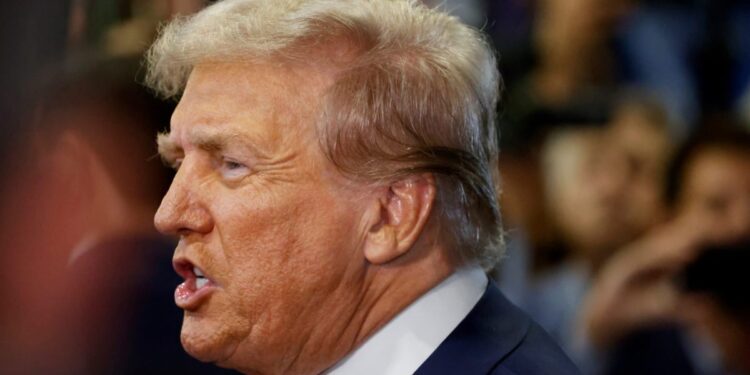Trump told many lies at last week’s debate against Vice President Kamala Harris. One, it seems increasingly clear, is the stumbling claim—meant to shore up his support of in vitro fertilization, or IVF—that he is “a leader on fertilization.”
On Tuesday, Senate Republicans provided even more evidence of Trump’s lie, by voting—again—to block a floor vote on a bill that would protect IVF access nationwide. Introduced by Sen. Tammy Duckworth (D-Ill.), who said she used IVF to give birth to her two daughters, the legislation would prevent states from enacting restrictions on fertility treatments.
Trump has done far more to impede IVF access than protect it. He is, in fact, the reason it’s in the news at all: Trump appointed three of the five conservative Supreme Court justices who overruled Roe in Dobbs v. Jackson Women’s Health Organization, imperiling IVF access in states like Alabama. (The state’s Supreme Court ruled in February that frozen embryos, often discarded in the IVF process, could be considered children under state law.)
Leading reproductive rights and fertility groups called on senators to support the bill, but the Republicans have made it clear they are not interested. With 60 votes needed to move forward, the “Right to IVF Act” failed to advance, with only Sen. Lisa Murkowski (R-Alaska) and Sen. Susan Collins (R-Maine) joining Democrats in their affirmative votes. This marked Republicans’ second sabotaging of the bill, which they also blocked from moving forward in June. (That same month, they also blocked a bill to protect contraception at the federal level.)
“The reality is that [Trump] is the reason that IVF is at risk in the first place,” Duckworth said on the Senate floor after the vote. “The Dobbs decision is what led us to today’s nightmare, taking the power to decide how and when to start families from us women, and handing it to politicians in statehouses across the country.”
Duckworth slams Trump on IVF, saying “he is the reason that IVF is at risk in the first place,” before imploring to her GOP colleagues: “Today's vote is your chance to put your vote where your mouth is.” pic.twitter.com/8i7fVmRaa8
— POLITICO (@politico) September 17, 2024
On a call with reporters Tuesday morning, Sen. Debbie Stabenow (D-Mich.) said if Trump was serious about protecting IVF he would have been conferring with Senate Republicans on how to move forward. “Where is he now?” she asked. “Where is he in the middle of all of this?” (The Trump campaign did not respond to a request for comment.)
Republicans called the measure a show vote. GOP legislators have offered counter proposals to enshrine IVF. Sen. Ted Cruz (R-Texas) and Sen. Katie Britt (R-Ala.) in May introduced a bill that would revoke Medicaid funding from states that ban IVF—but also not require any organizations to provide IVF, and allow states to regulate “health and safety standards” around it.
Leading reproductive rights and fertility groups called that bill—only 3 pages long, to Duckworth’s sixty-four page legislation—”phony,” saying it would not go far enough in protecting fertility care from restrictive state policies, and urged senators to support Duckworth’s bill instead.
A spokesperson for Trump’s running mate, Sen. JD Vance (R-Ohio), who was not in DC for Tuesday’s vote, accused Senate Majority Leader Chuck Schumer (D-N.Y.) of playing “political games.” Vance and Trump “fully support guaranteed IVF access for every American family,” the spokesperson said. (Trump also claimed that, under his watch, the government or insurance companies would pay for it—which reportedly baffled even his advisers.)
On the Senate floor Tuesday, Sen. Patty Murray (D-Wash.) said Cruz’s bill “does nothing to meaningfully protect IVF from the biggest threat from lawmakers and anti-abortion extremists.” She also highlighted the far more insidious threat that blocking these protections poses: It creates a potential pathway for Republicans to get closer to enshrining “fetal personhood” in the law.
As I have written, fetal personhood would ban abortion nationwide by granting full citizenship and rights to fetuses. Anti-abortion leaders have admitted is their goal. (As Murray pointed out, Cruz signaled his support for a fetal personhood amendment to the Constitution during his 2016 campaign; Vance has also signaled his support for fetal personhood and a federal abortion ban in the past, as I have covered.)
Cruz’s bill, Murray said, “is silent on fetal personhood, which is the biggest threat to IVF,” adding that it is also “silent on whether states can demand that an embryo be treated the same as a living, breathing person, or whether parents should be allowed to have clinics dispose of unused embryos, something that is a common necessary part of the IVF process.”
“That uncertainty is at the core of the bans that Republicans have caused,” she added.
Another way of looking at it is that the uncertainty may be the point. Republicans have been desperately trying to obfuscate their true goals for a second Trump term: They explained their plans—to ban medication abortion nationwide and eliminate the Department of Education, among others—in the 900-page Project 2025 playbook, and then Trump tried to distance himself from it, despite Trump’s and Vance’s documented connections to the initiative. The GOP has tried to promote the narrative they have “softened” on abortion despite reality proving otherwise.
And today, despite Cruz trying to paint the Democrats as anti-IVF and anti-family, it was the Republican party that tanked this vote—just like it was the Republican party that killed the expanded child tax credit.
Vance may want to remember this the next time he tries to claim this country makes it too difficult to have families.





